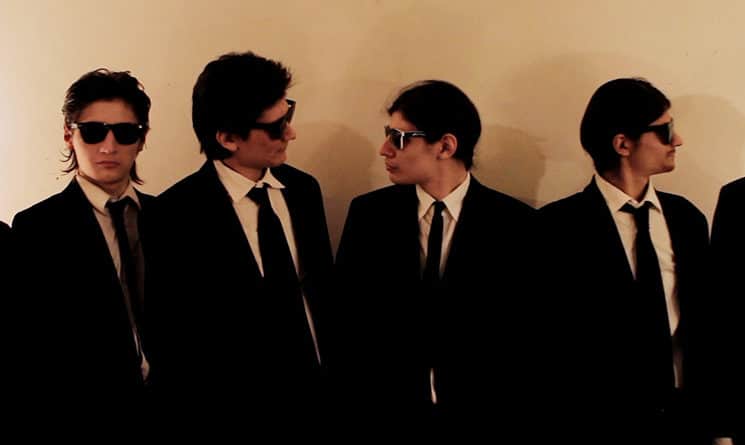When the six Angulo brothers step out of their Lower East Side apartment in Manhattan for a night out at the movies midway through the new documentary, “The Wolfpack,” they look like they’re actually stepping out of a Quentin Tarantino film. Dressed in dark suits, sunglasses, and black overcoats, for a moment, they’re the picture of cool, even if most of them are still teenagers.
As director Crystal Moselle follows their outing, though, the façade falls apart. One of the brothers thinks someone’s following them, and it seems like he’s only half joking. At the theater and out of their coats and jackets, they munch popcorn and frolic before the previews. And, after the movie (they watched 2010’s “The Fighter”), they gush, almost in disbelief, that money from their tickets will eventually make its way to director David O. Russell and stars Mark Wahlberg and Christian Bale. They’re not bad-asses; they’re just movie-mad kids.
The brothers have good reason to be crazy for cinema. As “The Wolfpack” reveals, the six, along with their mother, Susan, and sister, Visnu, were kept in almost total isolation for much of their life in their apartment by their father, Oscar. Movies were their only lifeline, and the brothers studied them obsessively, transcribing and typing out the scripts for films like “Reservoir Dogs” and “The Dark Knight” and then reenacting them using elaborate homemade props and costumes. They went outside once or twice a year; otherwise, everything they knew about the world came from film.
“The Wolfpack” catches the family in mid-transformation. In 2010, Mukunda, one of the younger Angulo brothers, ventured outside the apartment. He wore a homemade Michael Myers mask (the unstoppable boogeyman in the “Halloween” movies) and roamed the neighborhood, going in and out of stores and savoring his momentary freedom. The police were called, Mukunda wound up in the hospital, and city authorities ordered that the youngest brothers receive therapy. Once Mukunda escaped, though, something shifted, and Oscar’s grip on the brothers loosened. Moselle met them on one of their early trips outside, and soon began following the family.
“The Wolfpack” is a testament to the ways art offers a path out of sorrow.
The family’s story is compelling, and one of the film’s strengths is that Moselle lets the Angulos take the reins. Susan and the brothers — who range in age from teenagers to 20-somethings, and who all wear their hair long and have Sanskrit names — reveal bits and pieces of their seclusion, and the picture that forms is one more like a cult than a family. Abusive and violent, Oscar kept the family afraid of the outside world — in the film, he claims that by keeping the family inside the apartment, he was protecting them from drugs, violence, and “social pressures.”
The brothers’ perspectives dominate “The Wolfpack,” though. They’re angry at Oscar and traumatized by years of abuse. But they’re also joyful, about movies, about exploring their neighborhood, and about each other. In one scene, one of the brothers delights in detailing the handmade Batman costume they constructed out of cereal boxes and yoga mats. We see them at play, in old home movies and their own elaborate reproductions of popular films, and it’s hard not to smile at their enthusiasm, even though we know the awful context in which those movies were made. Moselle doesn’t exploit her subjects; in fact, “The Wolfpack” is in some ways more their film than hers, and what is revealed seems entirely up to them.
That’s the movie’s primary weakness. “The Wolfpack” is perhaps a little too loose. Moselle doesn’t offer any guidance — the brothers are never identified on screen when they’re speaking, and there’s no indication of how much time is passing. The family is changing, but it’s difficult to track each individual’s transformation, save for Mukunda, who becomes something of a lead character in the documentary and, eventually, takes a job as a production assistant and begins making his own film. Nor does Moselle press for details; we get a minimal sense of what went wrong, and though it seems like Moselle is being polite, the result is an incomplete story that raises a host of questions.
One of those questions is why Oscar, so fearful of the world and, by his own admission, so opposed to capitalism that he refuses to work, allowed his kids a steady diet of R-rated Hollywood fare. It’s central to the film, but, by the end, beside the point.
“The Wolfpack” is a portrait of a family coping with, and slowly recovering from, abuse. But, more than that, it’s a testament to the ways art offers a path out of sorrow. Without movies, the Angulo brothers might never have made it out of their apartment. Moselle films them watching movies together, their eyes fixed intently on the small TV in their apartment. They’re sitting together on a mattress that might as well be a life raft, the movie on screen a line to the shore. If they can make it, Moselle seems to argue, there’s hope for the rest of us.
“The Wolfpack” screens Sunday, July 12 and Wednesday, July 15 at 7 p.m. at The Music Hall Loft, 131 Congress St., Portsmouth, 603-436-2400. Tickets at themusichall.org.

